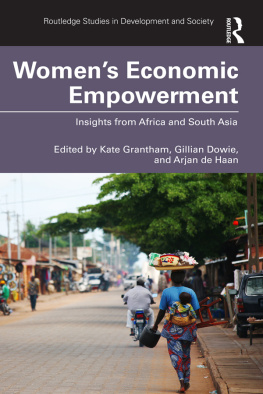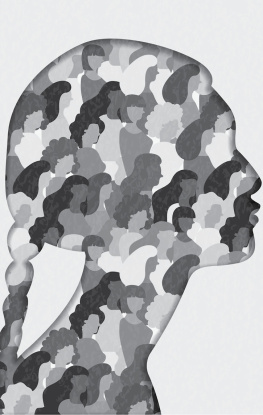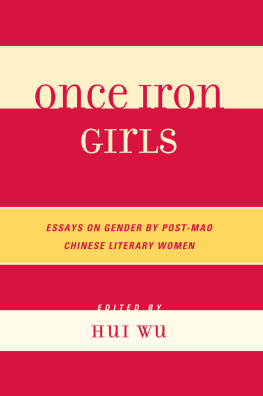SDG5 GENDER EQUALITY AND EMPOWERMENT OF WOMEN AND GIRLS
CONCISE GUIDES TO THE UNITED NATIONS SUSTAINABLE DEVELOPMENT GOALS
Series Editors
Walter Leal Filho
World Sustainable Development Research and Transfer Centre, Hamburg University of Applied Sciences
Mark Mifsud
Centre for Environmental Education and Research, University of Malta
This series comprises 17 short books, each examining one of the UN Sustainable Development Goals.
The series provides an integrated assessment of the SDGs from an economic, social, environmental and cultural perspective. Books in the series critically analyse and assess the SDGs from a multi-disciplinary and a multi-regional standpoint, with each title demonstrating innovation in theoretical and empirical analysis, methodology and application of the SDG concerned.
Titles in this series have a particular focus on the means to implement the SDGs, and each one includes a short introduction to the SDG in question along with a synopsis of their implications on the economic, social, environmental and cultural domains.
SDG5 GENDER EQUALITY AND EMPOWERMENT OF WOMEN AND GIRLS
UMESH CHANDRA PANDEY
Indira Gandhi National Open University, India
CHHABI KUMAR
Rani Durgavati University, India
United Kingdom North America Japan India
Malaysia China
Emerald Publishing Limited
Howard House, Wagon Lane, Bingley BD16 1WA, UK
First edition 2020
2020 Umesh Chandra Pandey and Chhabi Kumar.
Published under an exclusive license.
Reprints and permissions service
Contact:
No part of this book may be reproduced, stored in a retrieval system, transmitted in any form or by any means electronic, mechanical, photocopying, recording or otherwise without either the prior written permission of the publisher or a licence permitting restricted copying issued in the UK by The Copyright Licensing Agency and in the USA by The Copyright Clearance Center. No responsibility is accepted for the accuracy of information contained in the text, illustrations or advertisements. The opinions expressed in these chapters are not necessarily those of the Author or the publisher.
British Library Cataloguing in Publication Data
A catalogue record for this book is available from the British Library
ISBN: 978-1-78973-524-6 (Print)
ISBN: 978-1-78973-521-5 (Online)
ISBN: 978-1-78973-523-9 (Epub)
CONTENTS
List of Boxes and Figures
About the Authors
Preface
LIST OF BOXES AND FIGURES
BOXES
FIGURE
ABOUT THE AUTHORS
Umesh Chandra Pandey works as Regional Director of the Indira Gandhi National Open University (IGNOU) at Bhopal, India. During nearly three decades of his professional career, he has performed several academic and administrative responsibilities in IGNOU where he joined initially as Lecturer in Physics in 1990 and subsequently rose to the level of Deputy Director and Regional Director. He also worked as the Director of Knowledge Management in the School of Good Governance and Policy Analysis, Bhopal, India, where he significantly contributed for the identification, compilation and dissemination of best practices in governance. His current research interests include the open and distance learning and sustainable development. He holds an MPhil in Environmental Science and PhD in Physics.
Chhabi Kumar works with the Department of Sociology and Social Work, Rani Durgavati University (RDVV), Jabalpur. She has received her Masters in Social Work from the Tata Institute of Social Sciences, Mumbai, India, with specialization in Family and Child Welfare. She has experience of working in a wide variety of agencies and institutions spanning around 13 years, which includes special school, reproductive and child health setting, issue of community health and sanitation. She worked as a Senior Research Fellow with RDVV, Jabalpur and completed her Doctorate in Social Work from the same university. Her research interests include issues in higher education, open and distance learning system of education, sustainable development, gender issues among others.
PREFACE
The post-2015 agenda for Sustainable Development envisions a roadmap for progress that is sustainable and leaves no one behind. Investing in women and in processes to utilise their services, knowledge, experience and labour is a critical step in achieving this objective. This book is an attempt to explore the issues and challenges faced in realising the Goals and Targets under Sustainable Development Goals-5.
Gender inequalities have several facets which manifest themselves in different forms according to the context and situation of a region or community. Discrimination against women primarily takes shape during socialisation of individuals which ascribes certain roles and responsibilities to men and women. The gender stereotypes created are so deeply engrained in our minds that we tend to perceive gender equality only as a womans issue. Men tend to be isolated from the process; this gives a very narrow perspective to issues of gender inequality. Womens realities are constantly changing with time and situation, with new manifestations of discrimination regularly emerging. There are several factors that contribute to this discrimination; there are still others that increase or promote gender stereotyping.
Depriving women and girls of equal participation, choices and opportunities has several implications not only for their lives, but also for the future of the planet as a whole. This short book on gender equality outlines the various dimensions, namely, social, economic and political, which form the three pillars of sustainable development and how women have been systematically excluded from the process of development. The work suggests that the process of sustainable development is incomplete without womens participation and that much needs to be done to ensure their inclusion in the process. However, the lack of control and access to various resources and property is an obstacle to women making their contribution to the process of development. The role of childbearing and childrearing, the non-economic status of domestic work performed by women, low participation in economic activities and paid labour further exacerbate their inherently low position in society. Cultural norms and practices perpetuate their insignificant participation in various decision making and leadership activities in the political, economic, social, cultural and religious spheres of societies. This leads to the persistence of inequality traps, whereby women are unable to escape the vicious circle.
This book puts existing studies into perspective, discusses various aspects of gender-based discrimination and its manifestation across various dimensions. It further describes the importance of womens participation in the overall realisation of the sustainable development goals (SDGs). It is divided into nine chapters.
The first chapter Background discusses a basic understanding of the issue of gender discrimination and how the phenomenon is related to the concept of sustainable development. The second chapter Understanding Gender Inequality discusses the roots of gender inequality and the basic factors and institutions which are responsible for reinforcing the phenomenon at various levels. The third chapter Gender Inequalities as a Social, Economic and Political Challenge of Our Times highlights various issues which have implications for gender equality. The underlying challenges for developmental planning are described. The chapter also examines the consequences of the disadvantaged position of women. The fourth chapter Drivers and Indicators of Gender Inequality discusses the various measures and indicators used to assess the situation and condition of women at various levels and their importance in formulating policies and programmes associated with womens welfare. The fifth chapter Gender Inequalities in Developing, Middle Income and Developed Countries provides a comparative analysis of the different situations of women in countries at different stages of development, namely developing, middle income and developed countries. The sixth chapter Women and the Sustainable Development Agenda: A Historical Perspective highlights the challenges that gender-based discrimination pose to society and the world community as a whole in social, economic and political terms. Starting from Brundtland Commission report the chapter gives a glimpse of the global concerns for sustainability during past few decades. This chapter concludes with the description of SDG-05. The seventh chapter The Relationship of SDG5 to Other Goals elaborates on the interlinkages between SDG5 and other SDGs and the critical role played by women in achieving the process of sustainable development. The eighth chapter Policy Action for Gender Equality discusses the various policy strategies that may be used to tackle the problem of gender inequality. Finally, the ninth chapter Some Reflections on Inequalities brings out the concept as the defining challenge of our times and gives our concluding remarks.









